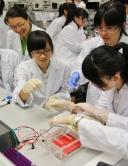Following last year's success, the iGEM (international Genetic Engineered Machine) team of The Chinese University of Hong Kong (CUHK) has won a gold medal again at the iGEM Asia Regional Jamboree, and is qualified to participate in the iGEM World Jamboree to be held at the Massachusetts Institute of Technology next month. The team consists of 9 students from the School of Life Sciences, 6 students from the Faculty of Engineering and 5 instructors. Since this May, the CUHK team had been devoted to preparing for the competition and developed the project completely by themselves, from defining themes, designing experiments to developing new parts and models from scratch. They demonstrated ample team spirit and efforts included publishing a wiki page, producing posters and introducing the project and the new devices on public occasions. In their award-winning project 'Light of No Return', the CUHK team has created bacteria harbouring rhodopsin to attract cells with different light spectra for cell sorting. The idea is to allow bacteria to 'see' and sense light source, so that light could be used to attract or separate bacteria. This technology may be used to improve the efficacy of chemical treatment such as water sewage treatment. The team has also successfully made new biobricks with introduce 'bacterial killing' DNA to enhance biosafety. These bacterial killing biobricks can enhance biosafety by preventing the proliferation of transformed bacteria and antibiotic resistant bacteria, which are also known as the super bugs. For details of the project, please visit the following links: In addition, members of the CUHK team also organized various high school outreach activities to introduce to high school students the potential social implications and significance in academic research of genetic engineering and synthetic biology through talks and workshops, with an aim to enhance their understanding and to raise their interests in this field. The team will also introduce synthetic biology and their project to the public at the University's Orientation Day on coming Saturday (27 October). About iGEM Competition iGEM is an annual premier synthetic biology competition for undergraduates worldwide. It was established by the MIT in 2004 to foster students’ learning in synthetic biology, promote collaboration among students and nurture biology talents. Participating teams are required to specify, design, build, and test simple biological systems made from standard, interchangeable biological parts. The accomplishments of these student teams often lead to important advances in medicine, energy, and the environment. For more information, please visit http://www.igem.org. |
|



